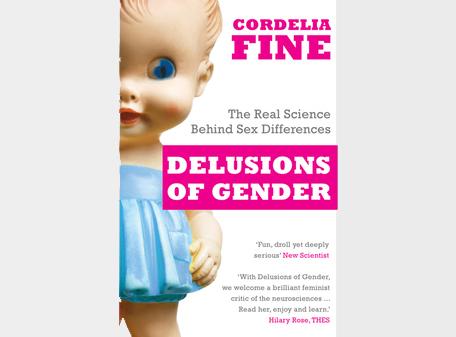Delusions of gender

A fascinating look at how our environment shapes our sexuality and a valiant rebuttal of many of the claims made by neuroscience, Cordelia Fine’s new book Delusions of Gender is a lively and worrying work which argues that the scientific community has often sabotaged the fight for gender equality. By Ed O’Hare.
Three years ago Cordelia Fine had an experience which horrified her. On entering her son’s kindergarten she heard the teacher reading to the pupils from a book which claimed that boys’ brains were structured differently to those of girls. Because of their rational, logical brains, the teacher said, boys could never consider things in the same caring, empathic way girls do. Fine was outraged. As a neuroscientist she knew that not an iota of scientific evidence backed up this pronunciation. The more she considered the way in which unverified and often highly speculative neuroscientific theories of gender difference have been widely accepted and promoted by the scientific establishment and the media, the more she believed it was time for her to intervene. The result is Delusions of Gender, one of the most trenchant and illuminating popular science books of recent years.
Fine’s case is a damning one. For decades it has been assumed that our gender is determined by our biology and that the brain is literally hardwired from birth to be male or female. Fine argues that today this almost universally held theory rests on the same amount of hard fact that has always supported it: none at all. However, the acceptance of this theory has had a great impact on every sphere of life, from the social and commercial to the medical and educational.
Fine believes that this theory is partially to blame for the painfully slow improvements in gender equality. As she explains, “The neuroscientific discoveries we read abut tell a tale of two brains - essentially different - that create timeless and immutable psychological differences between the sexes. It’s a compelling story that offers a neat, satisfying explanation, and justification, of the gender status quo.” Pseudo-neuroscience has given credence to the notion that there are skills men possess that women, because of their innate psychological difference, simply don’t. This has been used to justify all manner of injustices, from segregation and harassment to unequal amounts of pay and domestic responsibility.
Fine takes a two-pronged approach to attacking the gospel of in-built gender difference. First of all, she contends that society itself, the very environment into which we are born, plays a vast part in deciding our sexuality and the gender roles we come to occupy. Everything we do “we do with a mind that is exquisitely sensitive to the social environment around it”. We construct our identity on the basis of what we see, hear and encounter, and on the basis of how we imagine others see us. We are subject to a process of cultural conditioning that pressurises us into conforming to some recognised gender category. In other words, we become a stereotype and this can disastrously limit our development as individuals.
Fine addresses the question of why it appears that so few women have made significant achievements in mathematics and the sciences. On the basis of some alarming new studies she proves that the old stereotype of the mathematically inferior female remains sufficiently powerful that many women underperform in this and related areas because they have literally convinced themselves that they can do no better. Indeed, the prevailing stereotypes are strong enough that men and women attempting something not seen as culturally appropriate for their gender often fail, not because they can’t do it, but because the drive to conform overrides their natural abilities.
As this cultural conditioning almost always favours men, Fine believes it is much easier to understand why the movement towards gender equality has been achingly gradual. What’s worse, this stereotyping is so central to our behaviour, so ingrained in the social order, that the injustice it produces often passes unobserved. We live, in Fine’s opinion, in a “half-changed” world, one in which gross forms of sexism are loudly condemned but more subtle and equally destructive ones are scarcely noticed.
